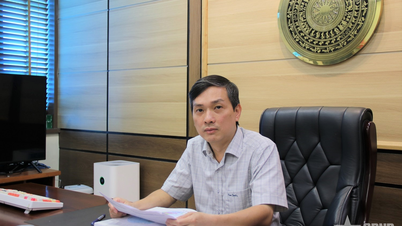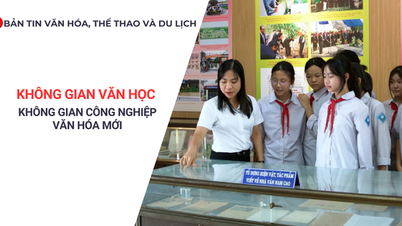Vietnam is considered one of the countries with a dynamic innovation ecosystem thanks to the rapid development of the digital economy and the strong growth of the technology sector. In an interview with the People's Army Newspaper, Mr. Vu Quoc Huy, Director of the Vietnam National Innovation Center (NIC), Ministry of Planning and Investment, clarified the advantages and difficulties in promoting innovation activities in Vietnam in the coming time.
One of the 7 middle-income countries making the most progress on innovation
Reporter (PV): 2023 is a year with many milestones in our country's innovation activities. What are the most prominent milestones, sir?
 |
| Mr. Vu Quoc Huy. Photo: TRANG MAI |
Mr. Vu Quoc Huy: Closing 2023, overcoming difficult challenges, Vietnam has achieved many achievements in innovation activities. Notably, the successful development of an integrated system to treat alum and saline water; the Military Industry-Telecoms Group ( Viettel ) successfully deployed the world's first 5G transceiver station according to Open RAN standards... In particular, the inauguration ceremony of NIC Hoa Lac and the Vietnam International Innovation Exhibition 2023 are considered the most important events of the year on innovation, bringing many opportunities and values to the participants. NIC Hoa Lac is the destination of innovation. The event contributes to enhancing Vietnam's position on the innovation map in particular and on the journey to become an Asian tiger in general.
PV: How is the innovation ecosystem in Vietnam currently developing compared to other countries, sir?
Mr. Vu Quoc Huy: Vietnam has made significant progress in improving its innovation indexes, taking advantage of its strengths to quickly catch up with the world in the field of technology. According to the Global Innovation Index Report 2023, Vietnam is ranked 46/132 countries and economies (up two places compared to 2022), and is considered one of the 7 middle-income countries that have made the most progress in innovation over the past decade. The Vietnamese government has established a number of funds and initiatives at different levels to support startups and promote entrepreneurship. Moreover, international organizations and corporations are contributing to the Vietnamese ecosystem through various initiatives and programs.
Vietnam's venture capital is on the rise. At the Vietnam Innovative Startup Investment Fund Forum 2022, the committed investment capital of 39 investment funds in the 2023-2025 period was 1.5 billion USD, the total investment value of Vietnam's innovative startups in the 3 years 2023-2025 is expected to reach 5 billion USD.
Vietnam is qualified to develop semiconductor industry.
PV: In your opinion, what are the biggest difficulties and advantages of innovation activities in 2024?
Mr. Vu Quoc Huy: In terms of advantages, Vietnam's digital infrastructure has developed rapidly in recent years, with impressive growth in the number of internet and smartphone users. In addition, Vietnam's online payment infrastructure is increasingly complete and expanding rapidly, providing many cashless payment options for consumers, including credit cards, bank transfers, and e-wallets. Vietnam has a young population with a high proportion of tech-savvy users who are ready to adopt new technology products. In addition, innovation and startups in Vietnam are developing strongly. The digital economy is forecast to have the fastest growth rate in Southeast Asia, at 31% in the period 2022-2025.
On the contrary, Vietnam lacks strong enough mechanisms, policies and incentives to promote a sustainable innovation environment. This poses challenges for innovation enterprises and startups in securing capital, attracting and retaining talent. In addition, there is a lack of large divestment deals. Vietnam needs more success stories in divestment to create confidence for foreign investors when choosing to invest in Vietnamese companies...
PV: Many people believe that Vietnam could become a semiconductor chip manufacturing center in the near future. What is your opinion on this issue?
Mr. Vu Quoc Huy: With 3 stages of the semiconductor industry value chain: design, production, testing and packaging, Vietnam only operates in the first and last stages. Currently, Vietnam does not have a semiconductor factory. For design, Vietnamese enterprises mainly have VHT (Viettel) and FPT Semiconductor participating with about 200 employees. The remaining 36 foreign companies from Japan, the US, Taiwan (China), China, and South Korea have invested in Vietnam with a workforce of about 5,600 engineers. For testing and packaging, Vietnam has an Intel factory and a few FDI companies doing assembly, testing, and packaging. Currently, Intel has invested 1.5 billion USD in Vietnam, operating since 2009 with nearly 3,000 engineers. In Bac Ninh, Amkor factory with investment capital of more than 1.6 billion USD is divided into 3 phases.
But I need to emphasize that Vietnam has all the necessary conditions and factors to develop the semiconductor industry. It is a stable political system, a favorable geographical location, and abundant high-tech human resources. Vietnam has advantages in design and is highly determined to pursue and develop the semiconductor industry with an increasingly developed digital infrastructure. According to a 2023 survey by the Ministry of Planning and Investment, Vietnam has the conditions and capacity to train about 50,000 semiconductor industry engineers by 2030.
PV: So, in your opinion, what actions should Vietnam take to reap the benefits of innovation?
Mr. Vu Quoc Huy: In my opinion, the Government needs to introduce policies and mechanisms to support innovation, including reducing barriers in regulations, administrative procedures, taxes, providing grants and financial support for research and development activities, and building appropriate infrastructure to encourage innovation.
Along with that, promote cooperation between businesses, research organizations, institutes and universities. This may include the establishment of research centers, incubation centers, etc., building training and internship programs to equip and improve the innovation capacity of students and employees. The government can also create incentive and support programs for startups and new businesses, including: Providing funding, low tax rates, consulting and management support, building infrastructure systems and networks to encourage the development of innovative businesses, etc.
PV: Thank you very much!
Source: https://www.qdnd.vn/kinh-te/cac-van-de/nang-cao-vi-the-cua-viet-nam-tren-ban-do-doi-moi-sang-tao-764037
Source


![[Photo] International community congratulates Vietnam on having more landscapes recognized as World Cultural Heritage](https://vphoto.vietnam.vn/thumb/1200x675/vietnam/resource/IMAGE/2025/7/13/58ec71f73ae644bfb5bab9c99043bb7d)


























































![[Photo] International community congratulates Vietnam on having more landscapes recognized as World Cultural Heritage](https://vphoto.vietnam.vn/thumb/402x226/vietnam/resource/IMAGE/2025/7/13/58ec71f73ae644bfb5bab9c99043bb7d)







































Comment (0)